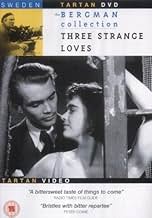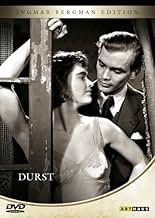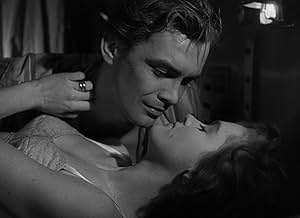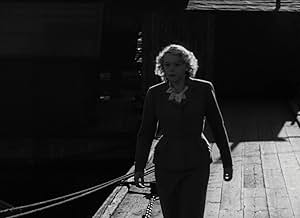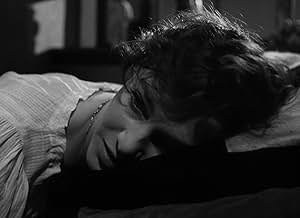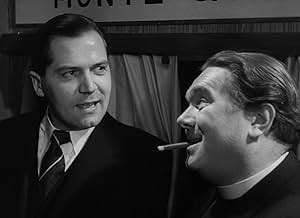A needy couple in a bad marriage travel back to Stockholm after a trip to Italy. Meanwhile, a widow resists seductions from two different persons - her psychiatrist and a lesbian friend.A needy couple in a bad marriage travel back to Stockholm after a trip to Italy. Meanwhile, a widow resists seductions from two different persons - her psychiatrist and a lesbian friend.A needy couple in a bad marriage travel back to Stockholm after a trip to Italy. Meanwhile, a widow resists seductions from two different persons - her psychiatrist and a lesbian friend.
Mimi Nelson
- Valborg
- (as Mimmi Nelson)
Carl Andersson
- Man on Train
- (uncredited)
Wiktor Andersson
- Doorkeeper
- (uncredited)
Verner Arpe
- German Ticket Collector
- (uncredited)
Ingmar Bergman
- Train Passenger
- (uncredited)
Britta Brunius
- Nurse
- (uncredited)
Calle Flygare
- Priest
- (uncredited)
Sven-Eric Gamble
- Glass Worker
- (uncredited)
Inga Gill
- Lady at Hotel
- (uncredited)
Herman Greid
- Newspaper Deliverer
- (uncredited)
Helge Hagerman
- Priest
- (uncredited)
- Director
- Writers
- All cast & crew
- Production, box office & more at IMDbPro
Storyline
Did you know
- TriviaThe first of three theatrical films directed by Ingmar Bergman that he did not write.
- Alternate versionsThe Tartan region 2 DVD restores the ending of the scene between Viola and her lesbian former schoolmate Valborg, in which the latter tries to seduce the former by getting her drunk. This had been cut by the Swedish censors before the film's original release and had never been seen publicly before 2004.
- ConnectionsReferenced in Dårskapens hus (1951)
- SoundtracksNon più andrai
(uncredited)
from "Le nozze di Figaro"
Music by Wolfgang Amadeus Mozart
Swedish Lyrics by Bernhard Crusell
Sung by Bengt Eklund
Featured review
I thought I had seen every Bergman film ever made, so I was thrilled to stumble onto this one the week after he died. I had no trouble following the intertwining stories because I kept track of the characters' names and their relationships. So what confused many viewers seemed totally justified, especially compared to films in our post-Altmam era where more and more we see "stories" where seemingly unconnected people's lives crisscross and are junxtaposed ("Magnolia," and "Babel" to name a few).
The filming is fantastic for the time and prefigures the use of close ups in "Through a Glass Darkly." Very different from "Port of Call" just before and "To Joy" just afterwards. I found the film less bleak than "Prison," its lyrical moments prefiguring "Summer Interlude," one of my favorite early Bergmans.
The lesbianism was blatant enough for me, much more obvious than in "Young Man With A Horn," made around the same time in the US. Curiously, this section of the film helped illuminate Bergman's use of the theme in "The Silence," and this makes me want to view that film again. The fact that this is a film Bergman didn't write is intriguing, because he harmonizes his visual language to the rhythms of the screenwriter's oral one. The dialog was rather light for the seriousness of the situations. Perhaps Bergman himself would have been heavier-handed.
Lastly, there are the actresses, and here Bergman's direction of actors seems to solidify, as I find his previous films much more uneven on this score. Here the women, especially the young dancer, show real depth.
Keep in mind that this is not his first film, but still an early work, a seed that will grow into later masterpieces. Then you won't be disappointed, even after the mediocre last minutes of a work that definitely showed promise.
The filming is fantastic for the time and prefigures the use of close ups in "Through a Glass Darkly." Very different from "Port of Call" just before and "To Joy" just afterwards. I found the film less bleak than "Prison," its lyrical moments prefiguring "Summer Interlude," one of my favorite early Bergmans.
The lesbianism was blatant enough for me, much more obvious than in "Young Man With A Horn," made around the same time in the US. Curiously, this section of the film helped illuminate Bergman's use of the theme in "The Silence," and this makes me want to view that film again. The fact that this is a film Bergman didn't write is intriguing, because he harmonizes his visual language to the rhythms of the screenwriter's oral one. The dialog was rather light for the seriousness of the situations. Perhaps Bergman himself would have been heavier-handed.
Lastly, there are the actresses, and here Bergman's direction of actors seems to solidify, as I find his previous films much more uneven on this score. Here the women, especially the young dancer, show real depth.
Keep in mind that this is not his first film, but still an early work, a seed that will grow into later masterpieces. Then you won't be disappointed, even after the mediocre last minutes of a work that definitely showed promise.
- How long is Thirst?Powered by Alexa
Details
- Runtime1 hour 23 minutes
- Color
- Aspect ratio
- 1.33 : 1
Contribute to this page
Suggest an edit or add missing content



